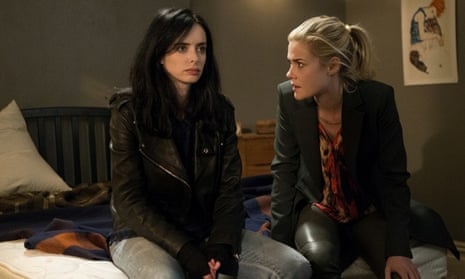Jessica Jones!
Wait, I didn’t even ask what the name of the show is yet. Marvel’s Jessica Jones! It’s based on Alias, one of my all-time favorite comic book series and I have been dying to see it. All 13 episodes are currently streaming on Netflix.
So, what is this comic book you’re so in love with? It’s called Alias (no relation to the Jennifer Garner show) and it was written by comic book genius Brian Michael Bendis from 2001 until 2004. It’s about a woman named Jessica Jones who was a costumed superhero until she met a villain so bad that he totally screwed her up psychologically. When the series starts, she’s a hard-drinking, piece-of-work private investigator who does a lot of work solving mysteries involving other masked heroes.
Is the show faithful to the comic book? Melissa Rosenberg, who was the head writer on Dexter and wrote the scripts for the Twilight movies, created this show for television and sticks to the source fairly closely. Jessica Jones (the amazing Krysten Ritter) is still a former costumed superhero whose life was ruined when a villain named Killgrave (David Tennant, thankfully using his natural Scottish accent and not his crappy American one) took control of her mind and made her commit all sorts of horrible crimes, including killing a woman. She still has a relationship with Luke Cage (The Good Wife’s Mike Colter) and she is still a private eye.
However, the rest of the details are a bit different. Instead of her ex-best friend being Avenger Carol Danvers, it is now Trish Taylor (Rachael Taylor), a former child star who is now a radio host. Instead of working for Matt Murdoch (who is really Daredevil) she works for a cold-hearted lawyer, Jeri Hogarth (Carrie-Ann Moss).
So, is this related to Daredevil? Yes, this is the second of five planned series that Marvel is making for Netflix, following Daredevil. Next up is Luke Cage’s own show, then one about Iron Fist, and then a show where they all get together to form a team called the Defenders.
Do I have to watch Daredevil to understand this? No, they are totally unrelated, at least for now. In fact, Daredevil doesn’t even show up, though he plays a prominent role in Alias.
If this exists in the same universe as Daredevil, why isn’t he in it? That is an excellent question to which only Marvel knows the answer.
So what are Jessica Jones’s powers? She’s super strong, hard to injure (though she’s not bulletproof) and can jump really, really high – though not quite fly. She might also shoot lasers out of her eyes, but we’re not sure yet. She doesn’t really use her powers a lot, however.
So, what happens on the show? Jessica thought she had killed Killgrave after he took control of her, but he survived. Now he’s back and trying to get his revenge by manipulating those close to her and strangers who get close to her. In the first episode, he kidnaps a girl and then sends her parents to hire Jessica just so he can get her back in his orbit.
Is the show any good? This is by far the best superhero show we’ve seen in a long time, mostly because it isn’t really about superpowers or catching villains. Also, thankfully, Jessica isn’t about a dark brooding boy who is super upset due to a textbook comic book ordeal. She has suffered trauma and is dealing with her PTSD. So are many of the other characters on the show, like her friend Trish, who suffered a similar attack, and Luke Cage, whose wife died. This is really a treatise on how life goes on after it falls apart and how people cope with tragedy. It’s packaged as a superhero thriller, but it’s much smarter than that.
Ritter’s portrayal of Jones is amazing: she finds just the right balance between brashness and vulnerability. She’s a total loose cannon, but not so annoying that you wonder why anyone would hire/date/befriend her. She’s looking for connection and driving it away at the same time, which is a fascinating dynamic and one applicable to many non-powered humans.
Unlike Daredevil, which was so murkily shot it was almost impossible to see the action half the time, Jessica Jones is lit crisply and clearly, capturing a sort of New York City grit that still exists in Manhattan even in this age of a Disneyfied Times Square. The action moves quickly, the stories are engaging, and the characters have lots to work with. This is how more people should be making superhero shows.
Is there anything wrong with it? The show focuses too much on the cat-and-mouse game between Jessica and Killgrave. Naturally she is obsessed with catching him, but stretching their feud out over 13 episodes may get pretty old pretty quickly. Honestly, by episode four I was ready for her to catch him and move on to something else. In the comic book, Jessica had unrelated cases to work through and non-Killgrave things going on in her life. I wish there were more of that here.
How is David Tennant? Honestly, for a show so fixated on its bad guy, he’s not in it a whole lot. However, when he’s around, he plays a controlling, arrogant idiot quite well, so cheers.
Should I watch this show? At the moment, it’s still for the comic book crowd. If it were just a touch better and really got into the implications of getting over trauma, Jessica Jones could be for everyone. Check in with me again once I’m done. I’d give myself another six hours.

Comments (…)
Sign in or create your Guardian account to join the discussion